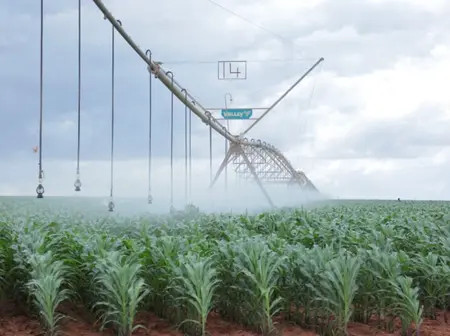The revitalisation of the Galana-Kulalu irrigation scheme has gained momentum as government agencies and private investors step up plans to convert thousands of acres into productive farmland. The project seeks to cut Kenya’s dependence on food imports and address persistent hunger.
Straddling the border of Kilifi and Tana River counties, Galana-Kulalu is one of Kenya’s most ambitious irrigation projects. Officials believe that once fully implemented, it could anchor the country’s food security strategy.
Nyumba Group, one of the private firms on the ground, has already begun large-scale cultivation of maize, onions, and cassava using pivot irrigation technology. According to company manager Kishor Patel, nine pivots are operational, each covering about 120 acres, out of the 23 installed so far.
“We have planted onions on roughly 200 acres, maize on about 500 to 600 acres, and a comparable portion with cassava. By early next year, when all irrigation pivots are fully operational, nearly 3,000 acres will be irrigated,” Patel said.
The firm has ambitious expansion plans, aiming to dedicate 15,000 acres to onions, 10,000 acres to maize, and 5,000 acres to cassava in the coming years.
Patel identified some of the issues that already exist such as animal damage to crops, fuel costs from the use of generators, upstream water pollution, and poor road infrastructure.
“Kenya’s climate and land resources make it ideal for agribusiness. More investment in agriculture will boost job creation and economic growth,” he emphasized.
Selu Africa Limited, which is spearheading the project’s commercial rollout under a public-private partnership, is rapidly expanding operations across 20,000 acres. CEO Nicholas Ambanya revealed that the company has already planted 1,500 acres of maize, with harvesting set to begin next week.
The cultivated area will expand to 3,200 acres by the end of the year and 5,400 acres by mid-2026, before eventually reaching the 20,000-acre target.
“To date, the project has created 500 employment opportunities, and we project that number will rise to at least 2,000 direct jobs once it is fully operational,” Ambanya said. While maize is the main crop, Selu Africa also plans to diversify into sunflower, chia seeds, groundnuts, mangoes, and green peas.
Ambanya credited the government for supporting critical infrastructure, including irrigation water supply, construction of a bridge over the River Galana, and upcoming electricity connections. He also disclosed that talks are ongoing to declare the site a Special Economic Zone, which would enhance investment and attract agribusiness players.
To address persistent concerns over wildlife intrusion from nearby Tsavo National Park, the company is building a 33-kilometre electric fence, setting up buffer zones, and training staff on strategies for peaceful coexistence with wildlife.
The government has positioned Galana-Kulalu as a cornerstone of its food security agenda. Joel Tanui, Irrigation Secretary at the State Department for Irrigation, said the National Irrigation Sector Investment Plan is designed to phase out Kenya’s reliance on food imports within the next decade.
“Our strategy includes opening up arid and semi-arid regions, which hold up to 90 percent of Kenya’s potential arable land, to irrigation farming and promoting large-scale commercial agriculture through public-private partnerships,” Tanui explained.
He added that the government is mapping unused community and institutional land for conversion into agricultural use. At the same time, state agencies are working together to deliver infrastructure, electricity, roads, and wildlife management support to ensure the success of these irrigation projects.

Leave a Reply